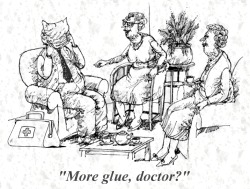 Nobody, least of all doctors, seems to know whether doctors themselves have an addiction problem. Smart-arse wise-cracking punters may define an alcoholic as someone who drinks more than their doctor, but, as with most smart-arsed wise-cracks, real evidence is hard to come by. What is more certain is that most doctors have problems with crack heads and cotton shooters. Substance misuse – to give the subject its sanitised, politically correct name – remains very much a Cinderella specialty, while many GPs – despite touting themselves as generalists happy to take on all-comers – refuse to admit drug addicts to their lists.
Nobody, least of all doctors, seems to know whether doctors themselves have an addiction problem. Smart-arse wise-cracking punters may define an alcoholic as someone who drinks more than their doctor, but, as with most smart-arsed wise-cracks, real evidence is hard to come by. What is more certain is that most doctors have problems with crack heads and cotton shooters. Substance misuse – to give the subject its sanitised, politically correct name – remains very much a Cinderella specialty, while many GPs – despite touting themselves as generalists happy to take on all-comers – refuse to admit drug addicts to their lists.
It is, therefore, very much to JD’s credit that he should not only treats addicts, but openly admits to doing so. Indeed, were it not that we know otherwise, the post hints that that JD’s practice is a right old Fagin’s Den of harboured criminals and space cadets in regular receipt of stratospheric prescriptions for all manner of controlled drugs.
While the post is ostensibly about one doctor criticising the clinical practice of another – a prison doctor opined that JD ‘should be shot’ for prescribing at such high levels (and Dr No is with JD on this – such opining is both out of order and unhelpful) – and takes in the ‘harm reduction’ approach to managing drug addiction – the approach JD clearly prefers and adopts – and even manages a jab at ritualistic, possibly even sadistic, prison medical services, it only, understandably, covers what to do when the addiction is present.
All this talk about managing addictions in various ways is all very well, but it misses the point that these addictions had to start somewhere. Many, of course, start on the street, in the club and at home, but a number, a significant number, are started, with not a little irony, by the very profession that in other guises and around other corners will agonise, argue and opine about how best to end addiction.
Those very same GPs who decline to soil their surgeries with the flotsam and jetsam of the drug underworld are far more inclined than they should be to start patients on teensy-weensy doses of benzos to tide their patients over the slings and arrows of normal misfortune. How much easier it is for an over-pressed GP, a long list of waiting patients rattling at the surgery door, to reach for the pad and write a prescription, than give the extra minutes of firm but drug free guidance?
Just as many take alcohol without becoming alcoholics, so many will take benzos without becoming addicted. But the risk is there, and many a patient has come to regret that first casual and unnecessary prescription that has started them on the road to addiction. The trouble is that, as long as GPs continue to behave like shopkeepers, they will forever be doling out unwise and unneeded prescriptions: the gatekeeper caught in the ‘gotcha’ of an apothecarial ancestry.
